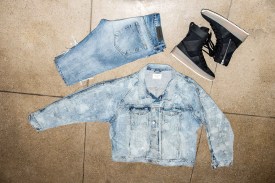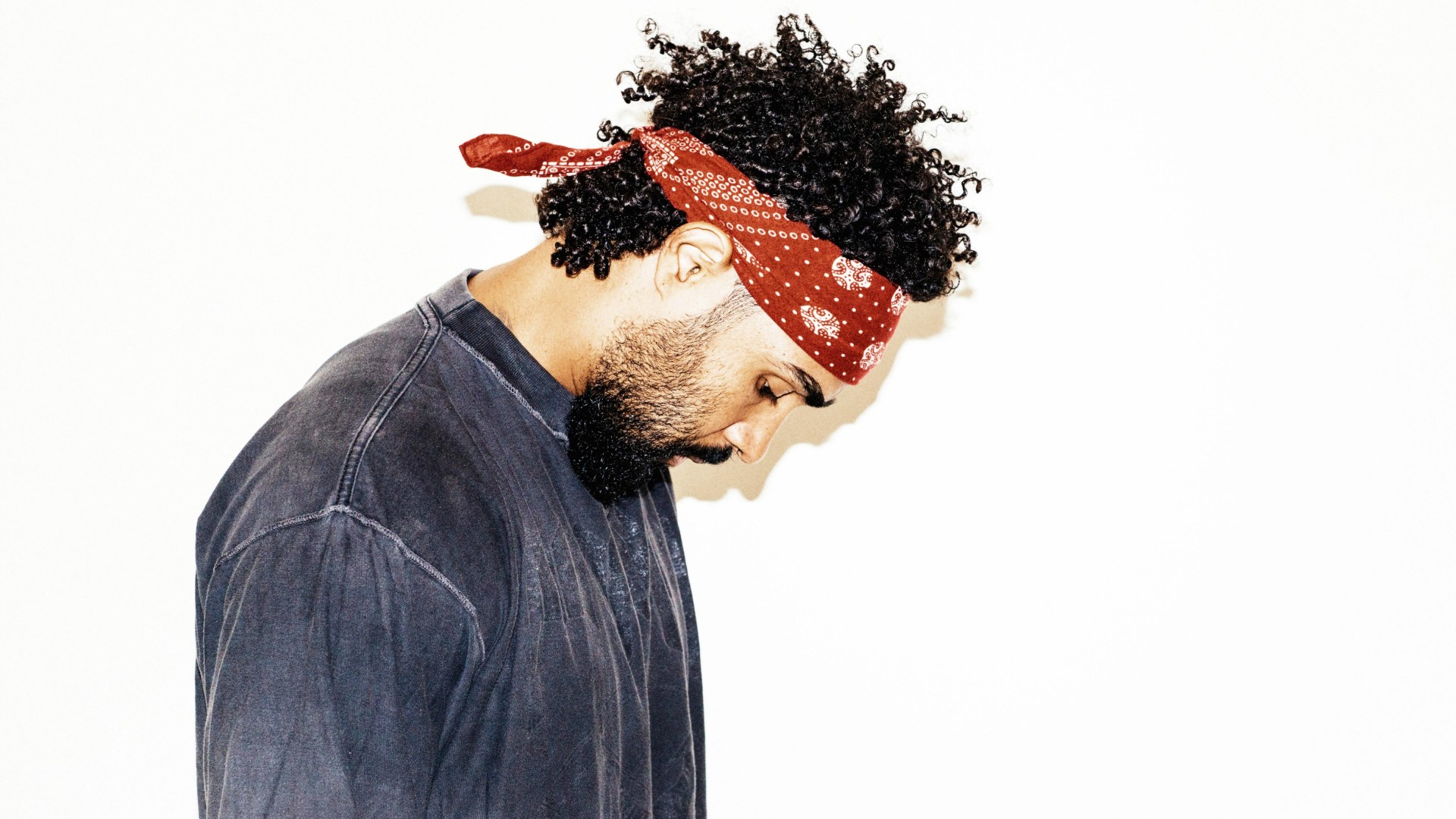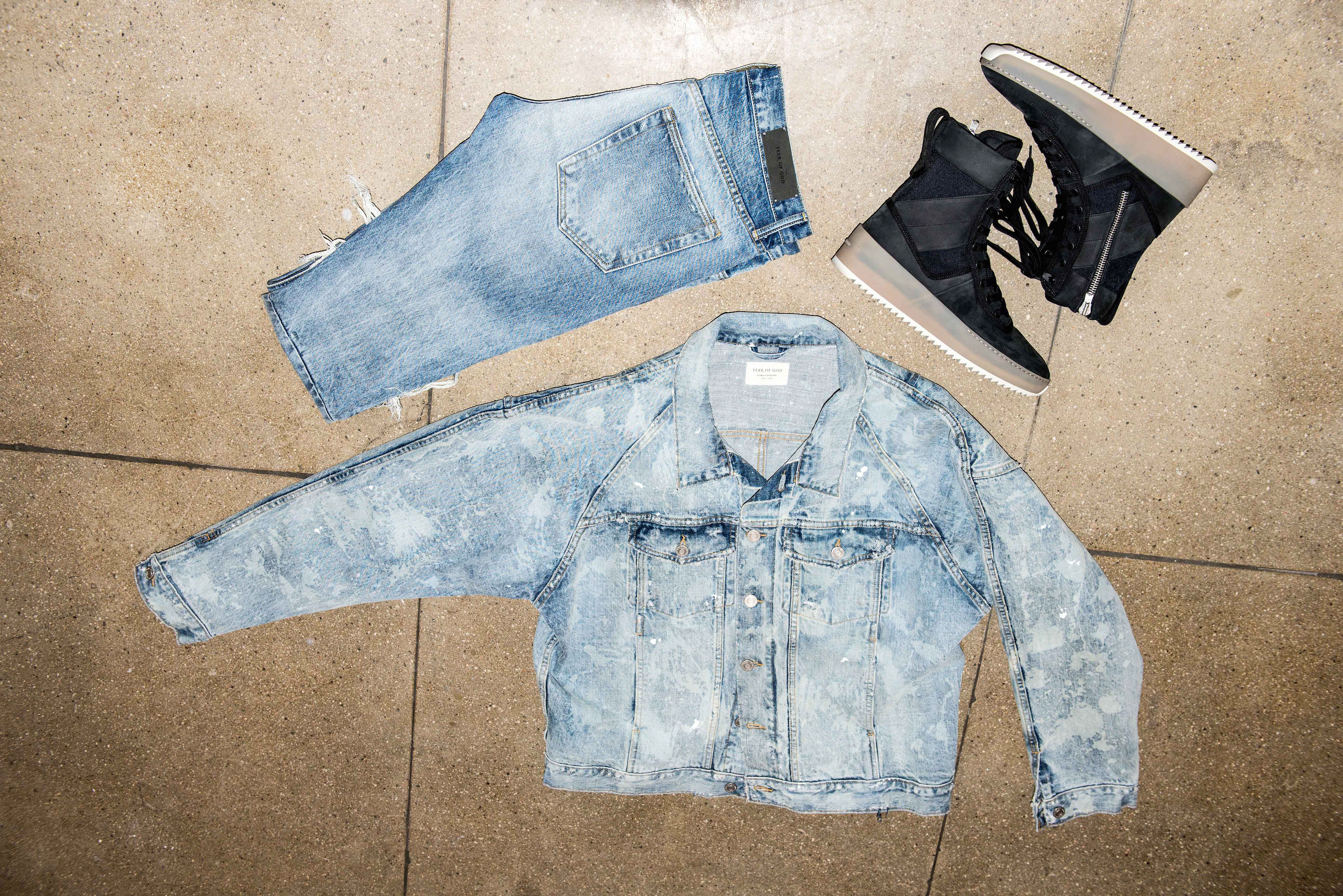You don’t expect to spot a reference to Oswald Chambers devotionals in the pages of Vogue—unless you happen to know the man the magazine calls “LA’s coolest” menswear designer, Jerry Lorenzo.
Considering the name of Lorenzo’s brand, Fear of God, or that the promotional video for his latest collection features the church favorite “How Great is Our God,” it’s clear that the 39-year-old doesn’t shy away from the Christian faith that inspires his work.
Without context, the Bible references on his apparel seem like lip service at best or ironic appropriation at worst. But the fervency and frequency of Lorenzo’s God-talk prove his faithfulness is more than a brand fad. You’d almost assume he was trying to evangelize through cheesy T-shirts if his style wasn’t so supernally hip.
“What makes Fear Of God cool is that it taps into the nostalgia guys from 50 years old to 18 years old have for the ’80s and ’90s,” explained GQ style writer Jake Woolf in an email. “He’s taking the touchstones of that era—stonewashed denim, plaid, slightly looser fits, awesome rock band tees—and setting them against a 2016 backdrop where streetwear, high-fashion, and ‘middle America’ all have collided.”
“The result is something that’s familiar enough to get customers in the door, but cool enough to be instantly recognizable in the streets,” Woolf said. This meeting of disparate elements is apparent in Lorenzo himself. He seems tough, with an armful of tattoos and bandana holding back tightly curled hair, but his slow, steady speech conveys more inner stillness than swagger.
So how did a dad with no formal fashion training who can’t shut up about Jesus become one of the hottest names in menswear? “If God’s given you a gift, you want to do whatever you can to honor him through that,” he said, “and I guess I have this gift about fashion.”
After years of working retail for high-end brands like Dolce & Gabbana and Diesel, Lorenzo became a manager for professional athletes. As he shopped for players, he realized that key garments he wanted—say, a short-sleeved hoodie for layering in hot Los Angeles weather—didn’t exist. Back in 2012, Lorenzo began visiting LA garment factories to learn how to put these pieces together himself. Six months later, he had enough for his first collection.

His design process involves pulling vintage pieces from an archive in Italy or thrift stores in LA, then working with a production manager to execute his vision for an updated version of the garment. “The essence of what I make is American classics with my spin on it,” Lorenzo said. “The goal is to modernize these pieces to make them say Fear of God 2016 and not 1984.”
Once Lorenzo started his fashion line, he knew he wanted it built on his faith.
“I started at a time when there was a lot of religious symbolism within fashion, much of it very dark,” he said. “I felt like the fashion world was open to a religious take. But I wanted to offer it and have the foundation be truth, not random symbolism for the sake of looking cool.”
The inspiration for the brand’s name, Fear of God, came from the classic devotional My Utmost For His Highest. “Growing up, God and Christianity had always seemed kinda light. I don’t wanna say they were corny, but if you grew up in church, you knew your church friends were never really as cool as the cool kids at school,” Lorenzo said. “But the devotional was talking about dark clouds surrounding the kingdom of God, and I saw the fear of God as reverence for this figure who was so layered and deep that he seems dark to us. For the first time, I saw God as this really cool character.”
That understanding served as the basis for Lorenzo’s first collection, which featured heavily layered, dark looks referencing grunge and hip-hop—what he describes as a mix between the late Nirvana frontman Kurt Cobain, whose likeness appears in Lorenzo’s vintage T-shirt collection, and 11-time NBA all-star Allen Iverson.
This unusual mashup also reflects Lorenzo’s church background. As a kid in south Florida, he attended an all-white high school, but spent Sundays worshiping at a black church 45 minutes away.
“These things served as the foundation of my clothing line—the grunge and rock that I listened to at my white high school, the hip-hop and soul and gospel that I was exposed to on the weekends by friends at the black church,” he said.
Though Lorenzo, his wife Desiree and three kids now attend a megachurch in LA, it took a rocky journey to get Lorenzo to his current place of shameless faith. He found his faith challenged by the pressures of the club scene.
“I was so concerned with this street culture that I’m in,” Lorenzo said. “I was not only trying to balance work and family, but I was also dealing with insecurities and wanting to have relationships that I thought justified who I was in the fashion world.”
After “coming to the end of himself,” Lorenzo backed away from nightlife and alcohol and shifted his relationship with God, allowing him to be more focused on his family life and more open about his faith.
“I love God so much that I don’t want to do things that hurt my relationship with him anymore,” he said. “Yes, those are things that I did, but who I am is identified in whose I am, not who I was.”
Pastor Carl Lentz of Hillsong Church in New York sometimes wears Fear of God while preaching, and Lorenzo calls him an iron-sharpens-iron kind of friend. Lentz once described Fear of God as having a “Trojan” approach: “People don’t really realize it’s about Christianity until it’s in the door.”

But Lorenzo’s less covert these days. “Maybe at the start, I was subconsciously like, ‘Aw, I’m not gonna put it too much out there.’ But I don’t take 400,000 kids following me on Instagram for granted. This platform is huge now, so I have to represent for who I know put me here, and why he put me here,” Lorenzo said.
His Instagram is a collage of worship lyrics, front-row views at fashion week, videos of his adorable kids, and paparazzi snaps of celebs like Kylie Jenner and Kevin Hart in his clothes. Lorenzo has spoken at Vous Church in Miami and collaborated on merchandise for Christian conferences. Rather than worrying that these efforts might alienate an audience more likely to swear on the infallibility of GQ than the Bible, Lorenzo hopes to leverage his influence to expose his followers to faith.
“Maybe a kid finds out about a conference that he never would’ve heard about and goes, and his life is changed,” Lorenzo said. So far, he hasn’t experienced negativity from the fashion industry for his frank and frequent references to his beliefs, perhaps in part because the brand has been so well-received.
Still, he feels some ambivalence about the idea of coolness as Christian witness. “Cool is fleeting,” he said. “If you love God and you put other people before you, that’s beyond cool. Cool doesn’t compare to that. What I’m doing with Fear of God is trying to show people that you can do what you’re passionate about and love God. Whether it’s cool to people or not isn’t really relevant.”
For Lorenzo, that means living in the tension of making clothing he’s proud of without communicating to fans (or his own kids) that being fashionable is his highest value. He also finds himself grappling with accessibility. Endorsements from mega-influencers like Kanye West and Justin Bieber may be a boon to the business, but price points only celebs can afford frustrate fans.
For those who can't spend $895 on jeans, Lorenzo has collaborated with mall clothing retailer PacSun to create a lower-priced line, F.O.G. He also goes out of his way to explain to shoppers what’s involved in making the premium-quality garments and shoes in his primary line. “I’m trying to honor the gift God has given me at the highest level,” he said. “At the end of the day, whatever it costs to make that is what it costs.”
In countries like Bangladesh and China, where the majority of the world’s garments are produced, lower prices often come from cheap labor in poorly regulated factory conditions. Lorenzo’s pricier pieces are manufactured only in LA and Italy, making labor ethics less of a potential problem.
Whatever one thinks of his prices, Lorenzo’s commitment to excellence is serving him well in the eyes of the fashion world. His collaboration on Bieber’s outfits for his latest tour has become the most talked-about aspect of the superstar’s concerts and has drawn massive crowds at pop-up shops in New York and Toronto.
Kanye caused a stir this year by breaking the prestigious Met Gala’s white tie dress code to wear ripped Fear of God jeans on the red carpet. And Lorenzo’s influence even extends into the more competitive world of womenswear, where supermodels like Gigi Hadid and pop stars like Beyoncé and Rihanna have donned his gear.
Still, for all the success he’s tasted in the world of fashion, Lorenzo insists that he’s not married to the medium. “The bigger Fear of God gets, the more I realize that it’s God’s—and that this could be any platform,” he said. “It doesn’t have to be clothing. It could be anything. This is just a platform for him to get glory.”
What does that mean to Lorenzo beyond using his own visibility as a way to expose more people to Christianity? He admits that communicating gospel values through fashion isn’t as straightforward as it might be in other creative mediums.
“For me to tell you that the zippers on this hoodie somehow correlate to Jesus Christ and my message of Christianity—that would not be an honest statement,” he said. “If anything, it’s just a humble elegance. There aren’t loud logos, it’s not overbearing, it’s not in your face. There’s an elegance there that says ‘I am a child of the King,’ but there’s a restraint that says ‘I’m not pushing this on you.’”
Christian interaction with the fashion industry often occupies extreme ends of the spectrum, with preachy, design-ignorant T-shirts on one end and designers at reputable houses scared to talk openly about their faith on the other. Lorenzo’s approach offers an appealing middle ground. He’s found a way to be honest about the fact that faith is central to what he does without coming off as holier-than-thou. As far as he’s concerned, this is what it means to be in the world but not of it. “You can’t be scared to get your hands dirty, to really get next to people and share your faith,” he said.
“I could never imagine myself starting a clothing line and not having it built on this foundation,” he added. “I felt like the world didn’t need another clothing line. But the world does need this message: At the end of the day, these are just fabrics. If you really wanna know what the fear of God is about, it’s a power that can change your life.”
Whitney Bauck writes about fashion and faith for the Washington Post, Billboard, and Relevant, as well as on her blog, Unwrinkling. Find her on Facebook, Twitter, and Instagram.











